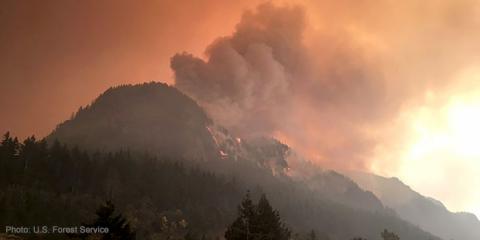Wildfire – the crucial conversation continues
April 24, 2018
Earlier this year, OFRI published a report titled “Impacts of Oregon’s 2017 Wildfire Season.” In it, we documented the hidden costs of fire, including impacts to air quality and health, school athletics, travel and tourism, employment and the economy, transportation, and iconic Oregon economic sectors such as the state’s wine and timber industries.
By all counts, last year’s fire season was horrific. The state experienced hazardous levels of smoke, including 160 days considered “Unhealthy for Sensitive Groups.” As thick smoke blanketed the state, emergency room visits increased by 86 percent the first week of September. The Oregon Shakespeare Festival in Ashland canceled nine performances, a direct loss of $373,000. The community of Sisters scratched its annual folk festival, losing $1.2 million in local economic impact. Cycle Oregon canceled its annual ride. For three weeks, drivers were detoured off their usual route across Interstate 84. More than 7,000 people were evacuated in order to escape fires in central Oregon, the Columbia River Gorge and southwest Oregon.
In the four-page summary of the 24-page report, we asked, “Where do we go from here?” I’m happy to report that people are stepping up.
In early March, the Oregon State University College of Forestry put on a two-day “Fire Summit,” where scientists and policymakers discussed potential solutions to combat worsening fire seasons. A report of those proceedings is expected this spring. In April, OFRI and several other sponsors hosted “Era of Megafires,” a presentation featuring U.S. Forest Service Pacific Northwest Research Station landscape ecologist Paul Hessburg.
This spring, our federal lawmakers also took a positive step. After six months of continuing resolutions, Congress finally passed, and the President signed, the $1.3 trillion Omnibus Appropriations Act, a plan to fund federal agencies for the remainder of 2018.
Perhaps no part of the act is more important to Oregonians than a plan to improve the way the federal government pays for wildfire suppression, as well as some much-needed forest management reforms.
The effort to change how the federal government pays for fighting wildfires dates back to 2014. That’s when it became obvious that federal firefighting costs were robbing other parts of the U.S. Forest Service’s budget originally earmarked for funding forest management, including restoration, thinning and other measures that reduce wildfire risk. The old plan clearly had failed. Wildfires continued to grow in number, size and intensity. And for many Oregonians, the 2017 “Summer of Smoke” was the last straw.
Oregon’s forests will never be “fire-free.” Nor should they be. Wildfires are part of the forest ecosystem. They remove fuels that can create conflagrations that endanger watersheds, wildlife and communities. Fires thin out smaller trees, allowing more water, sunlight and nutrients to reach the remaining trees and shrubs. They also create forest clearings favored by pollinators such as bees, butterflies and hummingbirds.
We have to live with a certain amount of fire and smoke, but we also need to manage our national forests for forest health, fire resiliency and public safety, including creating safer conditions for wildland firefighters. Fortunately, the omnibus bill includes some common-sense reforms. These include allowing the repair and reconstruction of forest roads under a deal that allows state agencies to perform forest management activities on federal land; creating legally sufficient pathways for hazardous fuels and wildfire resiliency projects; amending what’s known as the Healthy Forest Restoration Act to allow creation of fuel breaks and firebreaks; and managing vegetation around power lines.
It’s taken more than 100 years to create the crisis in our public forests, so we can’t expect results overnight. But Congress’ action is an important first step of many more to get us on the path to healthier, more fire-resilient forests.
For the forest,
Paul Barnum
Executive Director
